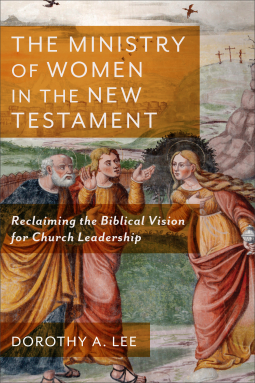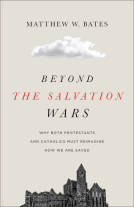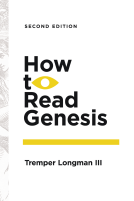
The Ministry of Women in the New Testament
Reclaiming the Biblical Vision for Church Leadership
by Dorothy A. Lee
This title was previously available on NetGalley and is now archived.
Send NetGalley books directly to your Kindle or Kindle app
1
To read on a Kindle or Kindle app, please add kindle@netgalley.com as an approved email address to receive files in your Amazon account. Click here for step-by-step instructions.
2
Also find your Kindle email address within your Amazon account, and enter it here.
Pub Date 16 Feb 2021 | Archive Date 1 May 2021
Baker Academic & Brazos Press | Baker Academic
Talking about this book? Use #TheMinistryofWomenintheNewTestament #NetGalley. More hashtag tips!
Description
Advance Praise
“Although the ministries of women, ordained and otherwise, have been acknowledged by great segments of the church, rejection and resistance persist. In this fine volume, Dorothy Lee presents a comprehensive and engaging case for the ordained ministry of women, drawing on evidence from Scripture, history, and the theological tradition. Her work challenges the idolatry of masculinity that continues to cripple men and women alike within the Christian community. A most welcome contribution.”—Beverly Roberts Gaventa, Distinguished Professor of New Testament, Baylor University
“It is unfortunate that a thoroughly biblical and theological case still needs to be made for the full participation of women in leadership and ministry (whether ordained or lay), but the experience of many demonstrates this necessity. Dorothy Lee brings together a knowledge of the scriptural and theological sources and a sensitive engagement with the many facets of the debate in this accessible and persuasive volume. She takes her readers through the varying voices of the New Testament as well as the lesser-known early church evidence for women’s participation in the work of the gospel, and she tackles these questions with confidence from a theological and social perspective. This book will surely encourage respectful discussion among all who look to Scripture and tradition as they wrestle with contemporary challenges.”—Judith M. Lieu, Lady Margaret’s Professor of Divinity Emerita, University of Cambridge
“Professor Dorothy Lee’s study of the Christian traditions surrounding the ministry of women makes a major contribution to an important debate. This crucial discussion is too often marred by shrill dogmatism from both sides. Professor Lee’s balanced starting point is that ‘there is no single, unanimous voice on women’s ministry throughout the history and experience of the church.’ Her data from the New Testament, early church teaching, liturgical practices, and iconography articulates significant biblical and theological strands too long ignored or misinterpreted. Her analysis leads her to affirm convincingly that ‘baptism is the primary symbol that draws women and men into a relationship with Christ that transcends all human barriers. . . . All Christians have the capacity to communicate Christ to others and to share his life in multiple forms of ministry.’”—Francis J. Moloney, SDB, Senior Professorial Fellow, Catholic Theological College, University of Divinity, Melbourne, Australia
“The Ministry of Women in the New Testament could not be more pertinent in an age where, despite some advances, the struggle for female participation in church leadership and ministry is far from over. Dorothy Lee’s expertise as a biblical scholar shines as she walks us through passages and profiles of women, who in both the New Testament and church tradition encountered the Lord and engaged in his mission at different levels. Lee has skillfully honed exegetical and historical rationales for the place of women at the altars and pulpits of their Lord.”—Adesola Joan Akala, New Testament fellow, St. John’s College, Durham University
“Without apology, Lee clearly and comprehensively presents the case for the ministry of women. She invites readers to consider the arguments and investigate the rich array of sources. I look forward to recommending this to students as they enter the weighty and challenging, yet rewarding, process of discerning God’s call.”—Amy Peeler, associate professor of New Testament, Wheaton College; associate rector, St. Mark’s Episcopal Church
“In this timely and much-needed study, Professor Lee offers a balanced, scholarly, and accessible foray into New Testament and early church understandings and presentations of ministerial roles for women. Her holistic approach makes sense of both these often-difficult writings and their treatment in developing Christian traditions. Her powerful conclusion leaves no doubt about proper contextualization and paths forward in our continual interpretation of Scripture and tradition for the vocational calls of all people. As the apostle Paul says, ‘No longer Jew or Greek, . . . slave or free, . . . male and female; for all of you are one in Christ Jesus. And if you belong to Christ, then you are Abraham’s offspring, heirs according to the promise’ (Gal. 3:28–29 NRSV).”—Sherri Brown, associate professor of New Testament, Creighton University
“Scholar Dorothy A. Lee strongly urges the church to go beyond the biblical texts usually cited as obstacles to the full acceptance of women in the ministry and leadership of the church. Instead, she urges the church to turn to the deeper currents of Jesus’s own example and to the New Testament vision of a church in which all women and men are recognized as equal sharers in the mission of the Risen Christ for the renewal of the world. Her study engages key New Testament texts and motifs and traces their evolving interpretations across time and cultures.”—Donald Senior, CP, president emeritus and professor of New Testament, Catholic Theological Union, Chicago
“Dorothy Lee offers a fresh review of the relevant New Testament texts related to women and ministry. Lee looks at women not only in the Gospels and in Paul’s letters but also in important passages in Acts, the Catholic Epistles, and Revelation, and she includes reflections on early Christian tradition and systematic theology. Newcomers to this conversation will find this book a great place to begin. Others will benefit from her discussions of the latest scholarship. Lee makes a well-rounded and compelling case for women in ministry.”—Nijay K. Gupta, professor of New Testament, Northern Seminary
“Dorothy Lee is a biblical theologian, and this is evident in her outstanding study of women’s ministry in the New Testament. Her biblical analysis is thorough as she carefully examines key texts. Her discussion of the ‘household codes’ helps readers to understand this particular genre, how it developed, and its purpose within a society where the gospel was preached in the face of hostility and persecution. Such codes had a place in their time but did not express universal principles for all times and places. She also moves beyond the biblical texts to other writings in the early church to examine how the canonical texts were received and interpreted in later centuries. She gives examples of ‘the need for dynamic reinterpretation in the light of new knowledge and new contexts.’ To be faithful to the tradition requires the ongoing reappropriation of these ancient texts. Lee then moves into the theology of interpretation and reveals the deliberate suppression of women’s leadership. Her later chapters develop two key faith professions of Christianity: ‘The Word became flesh’ (John 1:14) and ‘He has risen’ (Matt. 28:6). With theological expertise, she studies the need for symbolic language to speak of the divine and yet also the inadequacy of language. I wholeheartedly recommend this book to all who seek to expand their knowledge of the Scriptures, the tradition, and theological thinking. Bravo, Dorothy.”—Mary Coloe, associate professor of theology, Australian Catholic University
“In her deeply researched yet accessible new book, Dorothy Lee provides a much-needed antidote to the misperception that women in early communities of Christ followers were not community and church leaders. She aptly demonstrates from a variety of evidence and perspectives that the ministry of women flourished during the early Christian era.”—Ally Kateusz, senior research associate, Wijngaards Institute of Catholic Research, Rickmansworth, London
Available Editions
| EDITION | Other Format |
| ISBN | 9781540963086 |
| PRICE | US$24.99 (USD) |
| PAGES | 240 |
Featured Reviews
Respected scholar Dorothy Lee considers evidence from the New Testament and early church to show that women's ministry is confirmed by the biblical witness. Her comprehensive examination explores the roles women played in the Gospels and the Pauline corpus, with a particular focus on passages that have been used in the past to limit women's ministry. She argues that women in the New Testament were not only valued as disciples but also given leadership roles, which has implications for the contemporary church.
Publish Date: February 16, 2021
Thanks to NetGalley for the ARC. I found this book to be particularly relevant in this day and age. A strong message that encourages women to be disciples in the church and given leadership roles.
4 star
 Lark K, Reviewer
Lark K, Reviewer
In this comprehensive volume Dorothy A. Lee traces women's ministry in a systematic way through the New Testament and into the traditions of the early church.
Part 1: Women's Ministry in the New Testament
1. Mark and Matthew
2. Gospel of Luke
3. Acts
4. Gospel of John
5. Paul's Letters: Historical and Thematic Issues
6. Paul's Letters: Key Texts
7. Later New Testament Writings
Part 2: Women's Ministry in the Tradition
8. History and Texts
9. Theology
She combs through each book and letter and includes helpful charts detailing each woman (named and unnamed). Having it all laid out made it easy to see the impressive contributions of women. An important point was to challenge the unconscious bias many of us have when we hear the term disciples. Her continual refrain was to remind us that, unless it was explicitly just the 12 disciples, we should assume women were part of the group. From movies to flannelgraphs women are rarely visually included among the numerous followers and how we consume those images can impact our later reading of the texts.
This is a deeply scholarly read (over 600 endnotes!) diving into issues of textual criticism as well as theories on authorship and source material like Q. It may not be the best resource for a casual reader but it is not over the head of someone with a basic familiarity of Biblical criticism or those willing to dive deeper.
I particularly appreciated the last chapter covering the contributions women made to theology during the unfortunately named Patristic period. In seminary I am currently studying Theology 1 and having this resource alongside my textbooks has enabled me to see the hidden women who have been obscured in favor of the early church fathers.
Her fire burned brightest in the conclusion as she gave a passionate defense for the full inclusion of women in every aspect of ministry, lay and ordained. I hold to a generous complementarian theology and I did not agree with all of her conclusions. She made strong arguments regarding how feminine imagery such as mothering complements the androcentric language for God and challenges assumptions. Another area of strength was in pointing out the inaccuracy of translating 'adelphoi' as simply 'brothers' instead of a more accurate and inclusive term. However, one argument I thought was a bit overstretched centered on the household codes. She argued that authority structures within marriage were null and void. "Because slavery is now universally opposed we ought by definition to oppose the other." However, she did not mention the other group commonly found in those codes, parents and children and did not argue for the abolition of parental authority on the same principal.
Nevertheless, the entirety of the book was so compelling to the case that women's ministry need not be limited as much as it is now. No matter your views on the roles of women in ministry, I'd recommend it as an excellent resource in order to see the fuller picture of how women engaged in ministry roles in the first century.
I received an advance copy of this book from the publisher. All opinions are my own.
 Bookseller 145552
Bookseller 145552
Lee's book would make a very good text or handbook for understanding women's roles in the New Testament. She also includes work on women in the place of later tradition and a theological basis for women having complete equality with men. The goal of Lee's book is establishing how the New Testament records the ministry of women and by extension establishing a basis for the full inclusion of women in modern ministry. Analyzing the Gospels, letters, and other writing she details how various women were portrayed by the authors of the NT. Women were central disciples, evangelists, prophets, deacons, teachers, and among the apostles. If that is the case, why would we keep them from acting out of those gifts and callings today.
I would heartily recommend this book to those looking for an expert on the subject giving a high level overview of the material. The work is readable, organized, and a good middle ground for study.
I’m writing this review the day after reports that Beth Moore is formerly leaving the Southern Baptist Convention. That’s a relevant fact because, for decades, Moore has been the SBC’s most prominent female leader. In recent years, you began to see the cracks in the relationship as the SBC grew more patriarchal and Moore grew more egalitarian. It all finally reached a formal breaking point and, I expect, Moore will have no shortage of support from egalitarian denominations.
During this same time, the conversation about women in ministry has grown even louder and even into the more conservative and patriarchal sections of evangelical Christianity. More and more women are attending seminary, leading churches, preaching the Gospel, and contesting the notion that Scripture forbids female leadership.
Dr. Dorothy A. Lee’s The Ministry of Women in the New Testament is a firm, clear, concise exploration of women in ministry from the ministry of Jesus into the early church that unapologetically concludes that Scripture empowers women to minister, to preach, to teach, and to be Spirit-indwelled beings who live out their God-given callings. I use the term “unapologetically” not to mean that Lee writes brashly or with a chip on her shoulder, but in the sense that she is not mounting some sort of defense of women in ministry. This is not an argument, not an apologia; it is an exploration of fact that leaves very little to argue against.
The first part of the book covers the ministry of women as portrayed in the New Testament writings. The second covers women in ministry as portrayed in the tradition of the Early Church. It’s this latter section, even though it’s more of an addendum to the book proper, that really caught my attention. It’s one thing to exegete Paul, for instance, and conclude that the typical passages used to preclude women from ministry actually don’t mean that within their cultural contexts. The comeback to that is always to complain about a new faulty “liberal” interpretation of sacred Scripture.
By showing that the early church relied upon women in leadership positions, Lee is able to prove that an egalitarian ecclesiology is present from the time of Jesus. Those with better tools to know contextually, culturally, and linguistically what those passages meant obviously didn’t conclude they meant women couldn’t lead. In this section, Lee is also able to highlight mothers of the faith who have been overlooked because of the patriarchal nature of the church.
Elsewhere, Lee’s exploration of the person of Mary, the virginal conception of Christ, and the resultant female-created humanity of Jesus is nothing less than paradigm-shifting. To quote, in part:
“It is painfully ironic that Mary’s role in orthodox Christian theology as the ‘God-bearer’ (Theotokos), the one who conceives and carries that Son of God in her womb—who nurtures him through her placenta and feeds him with her breast when he is born—could lead to a diminished perspective on women’s relationship to Christ…By being the sole guarantor of his humanity, Mary raises women’s status as nothing else could…Christian belief in the virginal conception confirms that women are as closely bound to Christ as men are. Their historical unlikeness in one sense is compensated by their oneness to Christ in another sense—their gender confirmed in Jesus’s female-generated humanity.”
The bulk of the book is spent painstakingly going through the New Testament and exploring each passage and person relevant to women in ministry. While Lee is thorough, I don’t know that I saw anything I would consider revolutionary. Her positions are strong, bold, and obvious. They won’t the debate because these points have settled it thus far. Lee is content to not even try to bring up counterpoints. The merits of the original point stand on their own. While I would’ve liked to have seen a bit stronger response—or a direct response—to the complementarian position, that’s not Lee’s purpose nor does she pretend that it is.
Her final conclusion is simple:
“If Christ represents—and in doing so redeems—females as well as males, gentiles as well as Jews, slaves as well as free people, then the concomitant is also the case. Any human being, by virtue of the humanity that she or he shares by virtue of being made in the divine image and remade in Christ through the incarnation, is capable of representing Christ, a representation dependent not on gender but on vocation—whether at the altar or in the pulpit, whether in day-to-day acts of service or in martyrdom."
The Ministry of Women in the New Testament is a book that needs to be read, digested, grappled with, and above all, implemented. Dorothy Lee has handed us an exploration of the ancient tradition. It is up to us to follow it, even if it contravenes our more modern ones.
A clear, methodical exploration of the New Testament and early Church writing and tradition and what they have to say about women in ministry. Lee does not flinch from difficult, confusing, or potentially problematic passages of Scripture, but enters into them humbly and boldly. The book builds, chapter upon chapter, to a conclusion that pulls no punches and denounces the great harm done to women over the last two thousand years in the name of excluding them from any form of leadership in the Church.
Thank you for the chance to read this. Timely given what's been highlighted in the news related to "women's roles" in the church (Beth Moore, Rachel Held Evans, etc). This is a topic that has been discussed for centuries, many, including myself, not knowing where some misconceptions are coming from. She examines the roles women have in the Gospels as well as Paul's letters which are often used to explain why women aren't allowed in leadership roles. Throughout the Christian Bible (New Testament) women are seen being students of Jesus, leading in his ministry, and preaching in the community. An excellent read.








